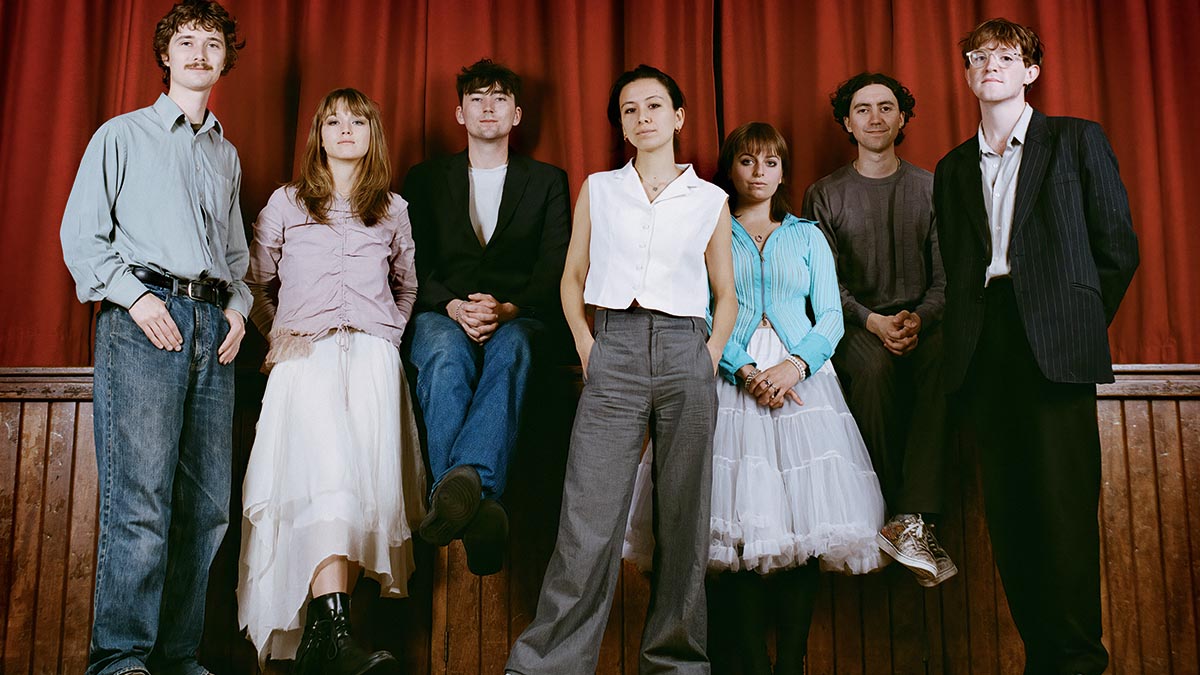Black Country, New Road’s Luke Mark on the time signature sleight of hand and ‘hacked’ Fender guitars behind the band's new album, Ants From Up There
After their surprise top 5 debut album, Black Country, New Road deliver a more melodic follow-up. But as guitarist Luke Mark says: “I insisted on being louder than everyone else!”

Hailed the best band “in the entire world” by one journalist, Black Country, New Road entered 2021 as a buzz band with their debut album For The First Time. Unusually for critics’ darlings, they then found themselves selling more records than expected. As the UK’s experimental indie scene gatecrashed the mainstream, BC,NR joined Squid and Black Midi at its forefront.
“It’s crazy to chart with an album like that and to get any kind of nod from outside indie circles,” admits guitarist Luke Mark. “The response was amazing. You go see Black Midi a few years ago and there’d be fifty people who loved it. After they put an album out, you go see them and there’s like a thousand people who all love it just as much.
“You don’t think it has that reach until it happens. Through the summer we did some festival shows and were very surprised at the size of them. We expected the Wide Awake Festival to be small but it was ten thousand people, a celebration of our scene. It was very odd to be playing on the main stage.”
Vocalist/guitarist Isaac Wood [who left the band in January] once joked that BC,NR would be “the next Arcade Fire." It’s a quip that might have backfired as the band drops its more accessible second album, Ants From Up There.
“We do love Arcade Fire,” Luke says, “but It was just a funny idea. Now it seems slightly cynical because the first album was surprisingly popular. Ants From Up There may from the outside seem like some bid for pop stardom, but it’s just how the songs worked out. From our point of view it was more of a risk than a safe bet because all of the people who like the first album could very easily not like this.”
Still, there’s an undeniable air of pride from the band about album two. “This is the record that we, like, wanted to make for a long time,” Luke smiles. “Making the first record was like ‘this is cool music, it feels new,’ whereas this record feels akin to what we liked as teenagers, making an album that we probably would have loved then.”
The band’s writing process changed too. “Because it was written while we weren’t playing shows, we’d have the start of a song and very slowly piece it together in a songwriting workshop. It ends up being a bit more considered, whereas if you’re doing it live you might just try an idea out to get an immediate response. When you have to do it loads of times in the room, it still has to seem good after all of that.”
Get The Pick Newsletter
All the latest guitar news, interviews, lessons, reviews, deals and more, direct to your inbox!
BC,NR elected to use their live sound engineer Sergio Maschetzko to produce, since no one has made them sound better. They demoed the songs once a month at London’s Lexington club, before returning to rehearsal to improve the arrangements.
“I think we did two or three sessions in the end,” Luke recalls. “During our first socially distanced tour, we did most of the songs live. Charlie [Wayne, drums] went out before every show and asked people not to record them because they weren’t done!”
Although they used the tour to premiere new material, BC,NR relied strictly on each other to judge which songs worked, as Luke explains. “When we played Chaos Space Marine on the socially distanced tour we thought people were going to love it.
"There was no response at all, just confused clapping, but we knew it was good. Once it came out as a single people really liked it. We think we’ve got such good taste that if we like it, it must be good!” he laughs. “We’ve never played anything and abandoned it due to a bad response from the crowd.”
Despite its more accessible songs, Ants From Up There opens unconventionally with an instrumental intro in 5/8 time. This, Luke says, is part of an ambitious composition strategy.
“The intro track is a motif that appeared elsewhere on the album. Lewis [Evans, saxophone] just played it once and we thought it sounded really cool. We wanted it to be established when it came up later on, not that it is particularly obvious. It’s Easter eggy.
“There are certain times when that theme pops up but not clearly. It’s definitely on Basketball Shoes and The Place Where He Inserted The Blade. It’s on Chaos Space Marine arguably, and then a couple of other places. It’ll pop up sometimes quite obviously; sometimes not so much.”
This approach to writing with motifs is reminiscent of how classical composers worked with a theme and variations. Luke explains: “If you take the theme as a starting point for writing a new piece, you might end up changing it beyond recognition. Whether or not it’s obvious, you’ve got something new out of it that hopefully gels in some way because it has a similar origin.”
Gear wise, the BC,NR guitar geeks remained largely faithful to their debut album rigs. “I think my rig evolved less than it would have usually because we haven’t been playing live very much,” Luke says. “But the Fenders continue to be hacked! I’ve been using Isaac’s gold Strat. It still has a Mojo Pickups Gold Foil in it, and now I’ve put an anodized metal pickguard on it: Gold Foil in the middle and the Creamery Firebird pickups in the neck and bridge.
“I was looking for ages for a bridge pickup that I actually wanted to use. It’s quite hard when you set up your sound around a middle pickup and make that really bright, you can’t really go any nearer the bridge. The Firebird pickup works pretty well.
I insisted on being louder than everyone else because the amp needs to be loud to sound good
“There’s definitely something about the attack that’s a bit Tele-like, especially for a hum-cancelling pickup. I just played that through an AC30. We recorded live in a room so it wasn’t like cranking anything to crazy volumes, but I insisted on being louder than everyone else because the amp needs to be loud to sound good.
“Isaac plays acoustic guitar on basically the whole album. It’s a Sigma acoustic with a Gold Foil pickup going into an Orange Custom Shop 50 with a bass cab. We also had a mic on it attached near the soundboard. Because we tracked it live we ended up not being able to use much of the mic. It was mostly to get that liveliness, that string noise and stuff. Isaac sang all the vocals live.
“To try and get a good live vocal take I was going to play his fingerstyle part from Bread Song on his acoustic, but he uses so much rubato, pauses so much to allow a line to breathe, that he had to play it because I wouldn’t have been able to read his mind.”

Although both Isaac and Luke are dedicated pedal hounds, the core tones are surprisingly dry. “A lot of it’s clean,” Luke says. “There’s little bits of distortion and occasionally really big distortion.”
This comes from Luke’s treasured Maxon Distortion Master. “It’s a bit of a secret weapon. I had to learn the hard way that the treble needs to be down really low and the bass needs to be up really high. I use a bright sound anyway so that’s why.” When the Maxon isn’t enough by itself, Luke hits it with a JFET clean boost pedal that Isaac built. Elsewhere, effects are fairly minimal.
“There’s not really any obvious delay but there’s a [EHX] Memory Man on most of the time because the preamp just makes everything sound wicked. There’s some tape delay on the guitars, from a tape machine I think, not from a delay unit.
"That’s on both the guitars on Snow Globes because it’s just two guitars playing in unison. It sounds a bit sh*t if you don’t play really perfectly, so there’s a slight bit of tape delay to make it sound nicer.”
With such simple guitar tones, the creativity comes more from the playing, which Luke prefers to being reliant on a particular pedal to make a part work. For Chaos Space Marine, he developed a chord progression with contrary motion, where the highest and lowest notes in each chord move in opposite directions. “It feels like it changes key but it doesn’t really. Now it’s hidden in the song it doesn’t sound that weird, but it is quite a weird chord sequence.
The odd-time intro isn’t the end of the band’s rhythmic trickery, but one of the most effective changes is deceptively simple.
“Concorde is in 6/8, but as it goes to the pre-chorus it drops to a hi-hat and a little bit of snare,” Luke reveals. “It kind of takes away the time signature. It just feels like what we always refer to as ‘1/1’! It builds this tension that you don’t get when there’s a really definite groove. It’s not mathy and it doesn’t sound that weird, it just makes it feel different suddenly.”
For The Place Where He Inserted The Blade, Isaac employs some unusually wide, piano-style chord voicings inspired by Blake Mills. And perhaps most unexpected riff on the album is in Concorde, in which Luke employs tapping: “I do a bit of clean tapping in the third verse,” he says. “I hold the chord and then tap extensions onto it with a sliding two-finger movement.”
Wherever BC,NR go from here, you’d be safe to expect the unexpected.
- Ants From Up There is out now via Ninja Tune.
Jenna writes for Total Guitar and Guitar World, and is the former classic rock columnist for Guitar Techniques. She studied with Guthrie Govan at BIMM, and has taught guitar for 15 years. She's toured in 10 countries and played on a Top 10 album (in Sweden).



![[from left] George Harrison with his Gretsch Country Gentleman, Norman Harris of Norman's Rare Guitars holds a gold-top Les Paul, John Fogerty with his legendary 1969 Rickenbacker](https://cdn.mos.cms.futurecdn.net/TuH3nuhn9etqjdn5sy4ntW.jpg)







